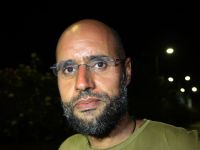The night Lebanese baladi dancer Alexandre Paulikevitch conjures up for his new show is Jan. 14, the night he was arrested, during the popular protests that had been sweeping the city.
Months on, a conspiracy of factors -- COVID-19, the Aug. 4 port explosion and a military tribunal -- have delayed the project, which has grown and developed with each crisis. In the first of a series of military tribunals for citizens arrested during the protests, Paulikevitch will be on trial Thursday, Sept. 23, alongside three others.
“I was beat up by the riot police and had a lot of pain in my body and when I got home around 6 a.m. I started humming and dancing,” Paulikevitch told The Daily Star. “It’s a question of loss, pain and essentially a revolt of the self, to view what is wrong or right. There’s a lot of grief and pain, but also revolution. We can’t keep being victims and we need to stand up. This is what the show is all about.
“It’s continued to morph until after the blast because you can’t create and arrive to a final product when these major events are happening. They impose themselves on the process of creation,” he added. “I’ve not been rehearsing due to lack of energy and my house was destroyed so physiologically I need to heal, get past this military court, fix my house and then get back to creation.”
The dancer-choreographer, who first debuted in 2009, has often come to the stage in flamboyant and colorful outfits, often paired with charmingly dramatic stage presences. No date has been set for the new show yet, but he’s described the project as very raw and blunt in both aesthetic and style.
“No music, no lights or sparkly costumes, because I have nothing anymore. So on stage I will go back to basics and see what can be done with just the body,” he said. “My house is gone so I have to reflect this.”
Paulikevitch expressed bafflement that a citizen could be tried in a military court, which in other countries is illegal. He was arrested for insulting military personnel and resisting them, a charge he denies.
“I was having dinner in Hamra and someone messaged me that help was needed at the Central Bank,” he said. “The police had pushed back the protesters and I was coming from behind. When I arrived, there was no one and they were starting to pick up people randomly and they arrested me.
“I hadn’t been there for more than five minutes or done anything and they dragged me by my hair and started beating me,” Paulikevitch added. “I spent the night in prison until protesters demanded our release. They later contacted me, saying I was facing military court.”
Despite the charges, Paulikevitch seems unworried. He reckons the true aim is to humiliate and frighten protesters, rather than actually sentence them.
“We’ll probably be made to pay a fine and sign some papers,” he said. “It will be an interesting fight to have and I’m ready for it.”
This article has been adapted from its original source.








